House of Commons Reception
As part of National Salt Awareness Week 2017, CASH held an evening reception at the House of Commons on Tuesday 21st March, hosted by Sir David Amess, MP. Around 100 guests attended the event, including NGOs, members of the food industry and healthcare professionals.
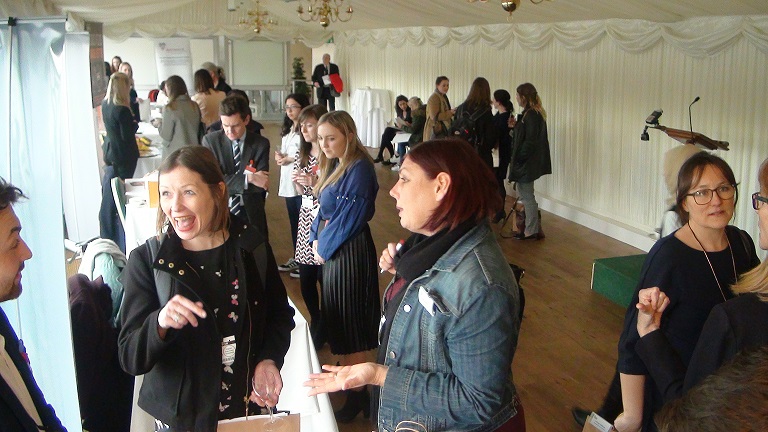
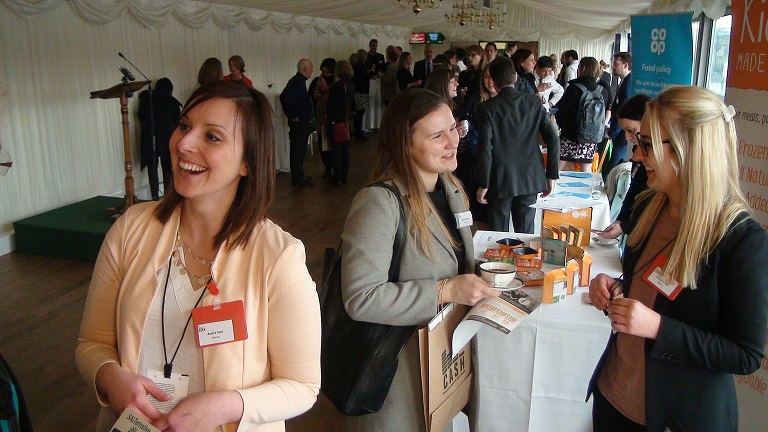
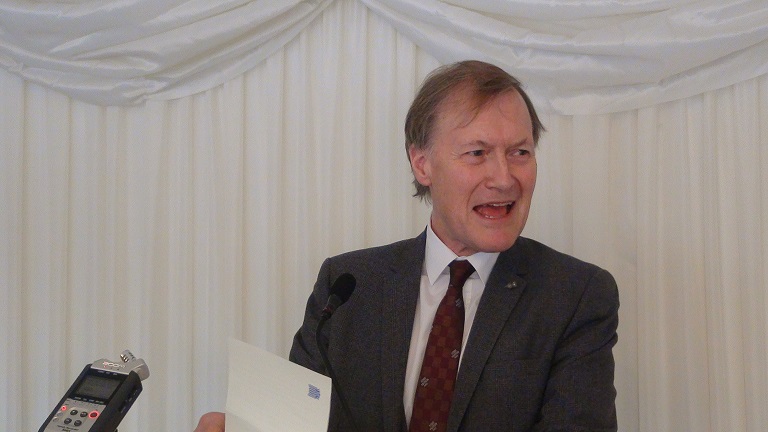
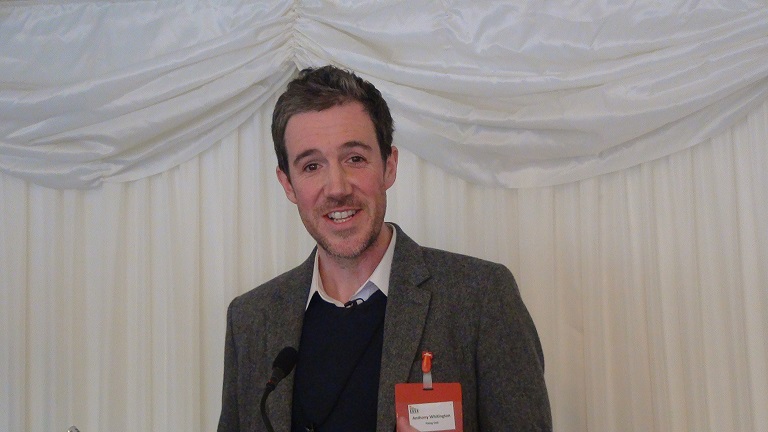
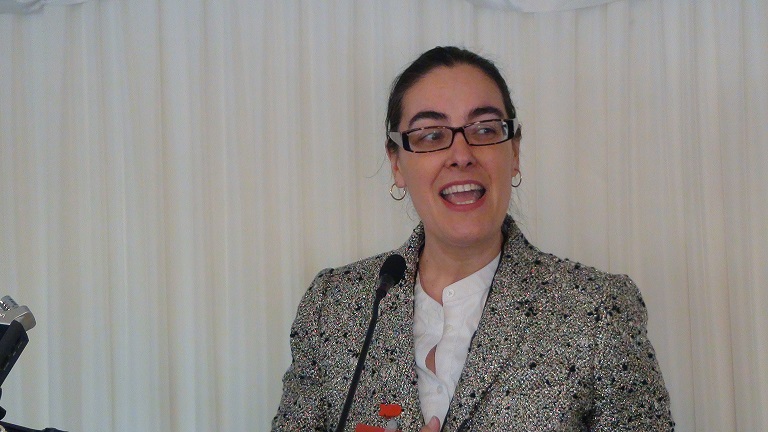
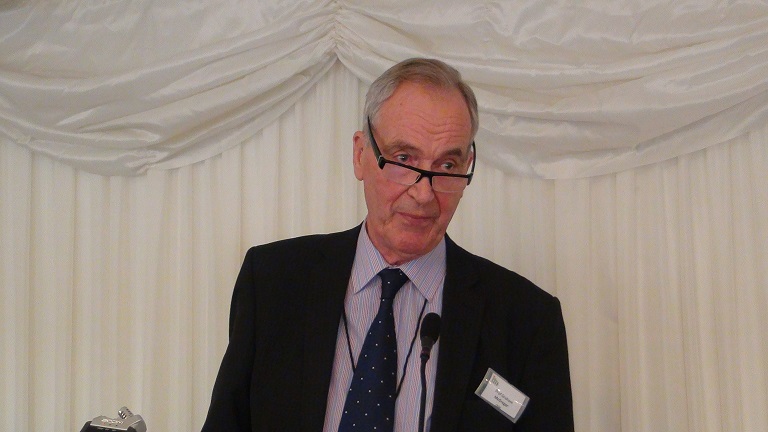
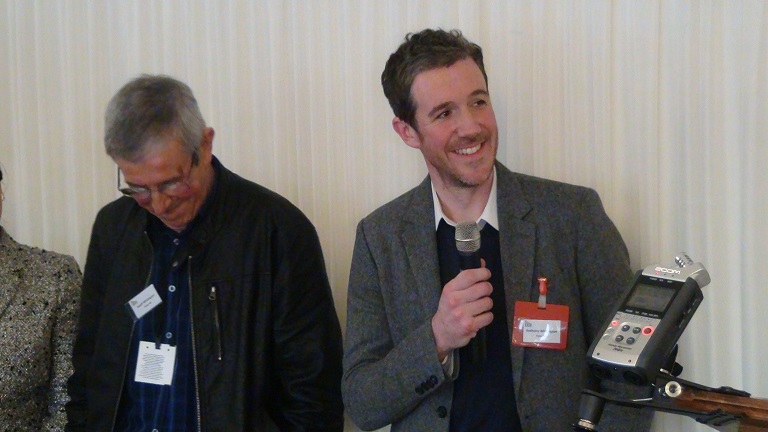
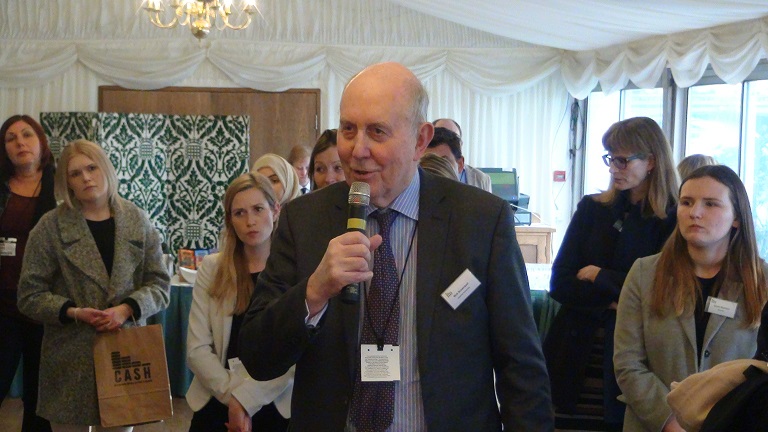
Presentations were made by:
- Sir David Amess, MP
- Anthony Whitington, Producer of Fixing Dad
- Andrea Martinez-Inchausti, Assistant Director Food Policy, British Retail Consortium
- Professor Graham MacGregor, Chairman of CASH
You can read what they had to say below.
Sir David Amess, MP
Hands up, who was here last year? A few new faces, I’m pleased to see. As you can see, the House is adjourned so all parliamentary representatives have now left to go and get on with their parliamentary emails, so just me left, I’m sorry about that, but you know how it is. Last year I started my speech with shocking news, some research that found that many new food items contained more salt than a McDonald’s Big Mac. Now where are McDonalds? It’s not a surprise that they are not here! Or a slice of Domino pizza! Those items included canned soup, chilled ready meals and cheddar cheese.
Now unfortunately, ladies and gentlemen, I can’t give you much good news this year, although Graham you were giving me good news when we were talking about sugar and the success down that road. Graham has just been telling me that we have unfortunately not done so well with our agreed salt targets.
So with less than 9 months to go for food manufacturers and retailers to meet the 2017 salt reduction targets, a new survey by CASH has found that out of 28 food categories analysed, only one has met the 2017 maximum, let alone the average salt targets. Graham, that is right, isn’t it? It’s been a dismal failure the last year. Many products analysed far exceed the maximum salt reduction targets, including some surprising ones, such as hot chocolate. Some manufacturers are trying to reduce the salt content of their products and the FoodSwitch UK app, a free smart phone app, developed by independent nutrition researchers, is helping consumers to make healthier food choices when out shopping. For instance, the app shows there is a staggering 97% difference in salt content between two similar types of cereal from different manufacturers. This survey demonstrates that the public health goal of consuming no more than 6 grams of salt per day is achievable, but ladies and gentlemen, more needs to be done by manufactures and by Public Health England.
Reducing salt consumption will have a marked effect on the nation’s health and cut unnecessary deaths from strokes and heart disease, exactly what we said last year, and save the National Health Service millions of pounds. So I commend the efforts of CASH and the researchers behind Food Switch to bring the silent killer of excess salt consumption to the public’s attention.
So ladies and gentlemen, the first of our speakers is Anthony Whittington, Producer of “Fixing Dad”. Anthony is a producer of the documentary “Fixing Dad” the story of Jeff Whittington, a man whose lifestyle choices caught up with him until his two sons resolved to save him. Jeff was heavy, weighed 20 stone, over worked and resigned to a premature death from a catalogue of health conditions which his sons are going to tell us about.
Anthony and his brother, Ian, decided that their own lives had to wait and they embarked on a mission to restore their Dad’s health and enjoyment of life. “Fixing Dad” shows the two brothers struggling to transform their Dad from an obese, barely mobile night time security guard to a fighting fit endurance cyclist, public speaker and health activist. So ladies and gentlemen, the winner of the best food film is not ‘La La Land’, it’s not ‘Salt Awareness Week’ - it is ‘Fixing Dad’!
Anthony Whitington, Producer of Fixing Dad
Thank you David. I’ve longed for those words but they never came, unfortunately. Thank you first to Graham, and the team at CASH for the invite today. We have been up here in the past but have never spoken.
“Fixing Dad” for those who don’t know aired on the BBC in August with a follow up coming out this August with a new challenge working with four other individuals with Type 2 Diabetes. The reason we are here is that it is a patient’s perspective. Dad was in an absolute state, as we know, he was threatened with losing a foot as a result of Type 2 diabetes, he was 20 stone and on a lot of medications. “Fixing Dad” tells the story of how we got him off all those medications, 10 medications, basically into great health and doing a 50 mile cycle in Boston this year, the New England classic and potentially the 100 mile. He is out all the time cycling - I can’t keep up with him. But on a personal note, I’m talking to you all today as an individual.
There is a picture of our Dad back in 2013 and a picture of him a year later and they are pretty much the classic before and after, so those ones are what you have seen in the Daily Mail and Daily Express, that’s what Dad was, you can see the pictures on our website. For us, there was much more than just a picture because a picture can actually mute a thousand feelings behind the moment and where the moment came from. “Fat man gets thin” was never our story and we don’t think we would be here talking to you today, if it was. Fixing Dad at its heart was a story of personal responsibility, which you hear all the time everywhere - so taking personal responsibility for your health and the health of the people around you. But, and this is why we get invited to events like this, there is something much bigger here as well which we can’t ignore.
We have a food industry which pays no attention to health and a healthcare system which pays no attention to food. As a result, we obviously have a very difficult situation with a struggling NHS, a struggling medical system that’s forced through time constraints, budgetary constraints, structural constraints to medicate people from the point of diagnosis through to an indefinite point on the horizon somewhere. And very rarely does anyone look over our shoulder to see what caused the thing and whether we might be brave enough to try and fix it rather than manage it or medicate it to death.
Ian and I set out in 2013 to fix our Dad and chose that term very carefully. We weren’t saving him, we weren’t implying we were better than him, not curing him because we had no medical knowledge and no idea whether he would pull through or not. The process of fixing Dad was very interesting because it made us aware about things in the past we were trained about, the foods we were eating and the route we were taking, we didn’t believe in, we weren’t enjoying - were making us sick. I was diagnosed pre-diabetic at the start of the project as well, but that process opened our eyes and thank god it did. There is a much bigger, much more important snap shot that we could never have captured in the moment before the cameras started rolling and the photos started being taken. Fixing Dad is the physical, emotional and mental before and after. So the before man was sitting with me at the kitchen table, making his will, working out how he was going to avoid leaving a mortgage to his wife Marilyn, versus the after man who is in utter disbelief at his own achievement as he crosses that line, opens the letter from the consultant who says he is in remission, and puts his pills in the bin as he says he doesn’t need them anymore. We have had hundreds of doctors say to us that’s the kind of waste they would like to see in the NHS.
So, how did food start this and how can it help? Many of the food brands, and some of them in this room, were ones that we utterly trusted. Growing up with Dad, was for us, fantastic, in that we could ask for something and Dad would do it for us. If we wanted a brand for dinner, then of course, it would happen. As a family, we would look at those main brands on the shelf and we would hear the 1980’s theme tunes and those adverts and we had a lifelong trust in them. We felt that fuzzy warm feeling and the message they gave was just that, don’t worry, you don’t have to cook, we will do it for you. And for Dad, it gave him an extra hour, essentially, for sitting, though he was sitting in his job and he could also to do other things in that time - and we could sit in front of the telly – it was convenient.
But during our project we put Dad on strict blood glucose, blood pressure monitoring devices and we checked both consistently before eating and two hours after eating and what we found was alarming. It was empowering for us; it gave us choices but in fact we only had one choice. The first thing we did was to say we can’t rely on all these food companies because we don’t know what’s going into the food and we didn’t feel that there was regulation and when we spoke to Graham, I think a lot of our worries were actually cemented. And we banned anything in a packet. That was our first thing we did, before we started looking at individual nutrients.
And our first advice to people who approach us now, and we get possibly 10-12 people a day, when they say what did you do and how do I do, it is first of all to cut out the packets. Unfortunately because that’s the situation we are in, and people can see this for themselves and they can monitor it themselves and a lot of people we are now see are wanting to make this effort, so we are seeing a movement around us. And the movement over real food is definitely gathering pace. But we can prove it can be done on a budget, we have done it with people on benefits so it can be done quite easily and even that is happening. So as people become more informed and aware, food companies have, we feel, an opportunity to be part of that, to actually foster health rather than damage it. And we commend you guys for the action you are taking in trying to do that, but I think it is really up the individual again and asking what we can do. Is it my mother, my brother, my father or my sister- what is it that I can do? Who can I fix?
It became for us family versus the food industry and that should never have happened. But we felt at that time that we had no choice. So the things to take away –
Number 1: there is nothing special about us. We had an Internet connection and blind hope. When patients are not getting an answer and getting sicker and sicker, a lot of people are starting to take things into their own hands, do their own research and question guidelines and question advice if it’s not there. And people up and down the country are starting to do this.
Number 2: the family should not be underestimated. The family, friends, support networks are the key to unlocking that after man, after woman, that key to the bigger picture that often only those closest to us know, others are not privy to. And I suppose that the warning there is work with families, not against them. Because ultimately that’s where the greatest trust is and that trust we had in the food brand was ultimately surpassed by the trust that we had in our family.
Number 3: Fixing Dad, we hope, will inspire the basic question for everybody, and that is a question we should all be asking, “Who will I miss when they have gone and could I have helped to fix them?” So not the food industry, not individuals it comes back down to that personal responsibility for individuals. Do ask the questions and keep asking the questions.
Thank you for listening.
Sir David Amess, MP
So now we move on to Andrea. She joined the British Retail Consortium 12 years ago as Deputy Director of the Food Policy Team. Andrea’s areas of responsibility include labelling, nutrition, allergens and compositional standards. She has done extensive work on pieces of legislation such as the food information proposal and the regulation on nutrition and health. She has also worked in the development of UK national ‘Front of Pack’ labelling scheme and she represents BRC in Europe and chairs labelling and the nutritional committees in the European retail organisation, EuroCommerce. She previously worked at Leatherhead Food International where she was responsible for assessing technical regulatory issues in a number of markets across the globe. Prior to this, Andrea trained as a vegetarian and worked again in regulatory approval for food healthcare. She’s done everything! She’s an expert!
Andrea Martinez-Inchausti, Assistant Director Food Policy, British Retail Consortium
Thank you. I have to start by clarifying. I am not a vegetarian or have trained as a vegetarian but as a Veterinarian. Slightly different!
Thank you ever so much for inviting me here today to tell the story of the retail industry. I, as has been described, represent a big industry, the retail industry. All of you would shop in a supermarket and those would all be our members. I will be brief but I have three points to make to you:
The first point that I would like to leave with you is that the retail industry has been engaged with salt reduction from the beginning. We were around the table in 2004, I think it was, when all of the discussions took place. We have been involved with salt reduction throughout all of the different processes which have been many in different iterations and different formats depending on the government department and the Government at the time and we remain fully committed to continuing to reduce salt.
Things are getting a little bit more difficult, the easy wins happen at the beginning so the first years it was much easier to reduce salt, some things contain high levels of salt so it was easier to look and to see where that could cut down from. We were aware of a lot of the alternatives that were available. A lot of those wins have been had and now reformulation is a little bit trickier. So we persevere and we continue. We share a lot of expertise amongst our members but its becoming a little more difficult. The other added difficulty (but again I am not necessarily suggesting that those difficulties are impossibilities, they are just things that we are looking to address and looking to work on), is that when we started on salt all those years ago, now it is about product improvement. So we are looking at salt, we are looking at fat, we are looking at the calories in the food, looking at the sugar – so it’s all about improving both the negative nutrients that we should consume less of and increasing those positive nutrients with other possibilities for example fibre which we are not consuming enough of at the moment. So that work will continue. There is a very strong commitment that remains from the retail sector for that work to continue to deliver and we will share that progress openly with CASH and other organisations.
The second point that I am delighted to share with you, a slightly better story – you will have all received the press release that CASH put out with all of the information about the data that was collated. We were unfortunately a bit late in sending that information to you guys, sorry, but we put together a piece of work collating information from eight retailers and incredibly I have to say that it looks a lot more positive than some of the work that has been shared. So seven categories, nearly eight, have already been met by all of our members, nine months ahead of time and we are confident that more of the categories will be met by the deadline of 2017.
In those categories which have not been met, some of them are difficult, some of them have products that are proving complicated, but the level of achievement in some of those categories is very high. And anecdotally, I can tell you that we have a member of BRC who has made 97% of the salt category, so the level of progress that has been made, by all members is pretty outstanding. I would say that having said that and having seen the data from CASH which is slightly different does not mean that the data you have is not right. It is absolutely right, but to us it highlights that there is a lack of a level playing field. There is more progress being made by some companies than others, some companies are more engaged than others. Again, in the product improvement path, product improvement activity and work that we are all undertaking we have to find a way to try to engage companies, share the intelligence and we have to get more companies on board. We have to get more of a level playing field to deliver on the progress that we have. Some companies have not prioritised the work or do not have the resources so we have to try and find ways of getting more companies on board and working together and delivering more.
Thank you.
Sir David Amess, MP
So there is a difference between being a vegetarian and Veterinarian. I have learnt something there! Our last speaker is Professor Graham MacGregor, who is the Chairman of CASH. Now he’s marvellous and he achieves something in sugar and now he is going to tell us how he is going to tell us how we might achieve something with salt.
Professor Graham MacGregor, CASH Chairman
Thanks very much David, and particularly for hosting this and being such a master at this – I wish I had your ability to capture things so neatly! So we are into the 18th or maybe the 19th Salt Awareness receptions at the Houses of Parliament and it’s a great privilege to be talking to you again. It’s great to see so many people. Now we have two strategies we are pursuing – one is like you heard with Fixing Dad, that is to get individuals to take action and that’s what our FoodSwitch UK App is all about as it does allow you to look at foods and choose foods with much less salt, sugar and fat and get people to fix themselves. That is very difficult to do, as you can see, but some people can do it and we need to encourage that.
The other way is to get the food industry, who are stuffing all our foods with unnecessary amounts of salt, sugar and fat and a lack of fruit and vegetables, which is the biggest global burden of disease - the food we eat now. We need to slowly get the food industry to reduce those things in all the products across the board. If you do it slowly the public don’t notice. You all know your salt intake has reduced in the last 10 years, but the joy is that the majority of the public don’t know it’s happened. That is a brilliant health policy as it doesn’t require anyone to change what they eat, much as we would like them to change what they eat! And because it’s a slow process you have to be very persistent and go on and on being bloody minded and sometimes it’s necessary to be charming.
On salt reduction, we were the first country in the world to do this, with the Food Standards Agency. It was a very successful programme, but it was then taken over by Andrew Lansley and the Responsibility Deal which stopped everything. Anna Soubry was a really good Public Health Minister and I persuaded her to set the targets again for 2017, which is what we are talking about now. This is the third set of targets and we are gradually screwing them down to set a target and then after a while and before you have met them, you set the target again lower and lower and gradually get them to take it out. We managed to set the targets for 2017 but we were under the Responsibility Deal which meant that the food industry was responsible for themselves and anything happening. Public Health England were then allocated both the sugar reduction and the salt reduction. Now so far, as you see from our press release, they have done nothing. Duncan Selbie said they would be doing something later in the year. And this is very sad as you will notice that there isn’t much representation from Public Health England here and they completely misunderstood what we are saying. We are saying to them, they need to spend a few hundred thousand pounds to get more people in, to properly run the salt reduction programme which has been running in chaos for the last five years, so it is properly policed, people are rewarded who are hitting the targets, those who are not are highlighted. But it’s not happening as there are too few people involved and they are all working on sugar.
Now let me just give you the financial situation. You can spend probably about a quarter of a million pounds a year in Public Health England reinforcing the salt targets and it would save for each gram reduction in salt in the population, according to NICE (National Institute of Clinical Excellence) £1.5 billion in health care savings costs. £1.5 billion! That is largely because it prevents people suffering a stroke and surviving. You are preventing those strokes occurring. So if you are paralysed on one side and can’t move that costs the State between £0.5 million and £1 million per patient. So you can see 1000 patients is almost a £1BN and that is what we are preventing with the salt reduction. So it doesn’t make sense for Public Health England not to be spending money. They are spending £800 million a year on cardiovascular screening for 40-70 year olds and there is a big debate on whether its beneficial or not and the savings are not in that order at all. Salt reduction is the most cost effective programme we have. Now in the survey, we were able to show that many of the products have reached the 2017 target but there are similar, identical products that haven’t. So if one company can do it, so could all the others. And these are lame excuses –as much as I appreciate what Andrea has been saying, that it’s getting more difficult - I would argue that apart from one or two small categories of food it is very easy. So the survey has clearly shown that it can be done and we need to hit those targets to save people dying and suffering unnecessarily from strokes and heart attacks.
We need to reset the targets. They should have been set two years ago but nothing has happened. We should have further targets now, for 2020, but Public Health England say “Oh we’ll think about that next year” but they should have been set two years ago. That’s the principle, gradually screwing them down. So where are they?
The FoodSwitch UK app which you should have all seen, allows you to choose food with less salt, sugar and fat, and if you haven’t seen that I would take a look. Our opinion poll, clearly showed that people are very ignorant about salt. Very few of them are aware of what the biggest contributors are and this is an exercise in education that we really need to focus on because I do think its important people understand.
There are huge national events going on all over the country, over 650 events, which I do think is absolutely amazing. They have been organised by Katharine and others with the people who live there. Also we have events occurring in over 100 different countries due to our WASH members (World Action on Salt and Health) so Salt Awareness Week events occurring all over the world. Again, a tribute to the pioneering action that happened in the UK - we were the first country in the world to start reducing salt in an organised way and nearly every country has copied that programme in various ways. I think that’s a great tribute.
So we need to do more action; we are very grateful to all the people who are supporting us particularly Aldi, The Co-op, McCain, LoSalt, Kiddyum, Kudos Blends, SALTernative, Waitrose, Sodexo, CH&Co and Pret a Manger. We have over 21 supporting health charities: Alzheimer’s Society, Blood Pressure UK, British Heart Foundation, Campaign for Better Hospital Food, World Cancer Research Fund, Children’s Food Campaign, Chest, Heart & Stroke Scotland, Cancer Research UK, PKD Charity, Heart Research UK, Kidney Research UK, Heart UK, National Obesity Forum, National Osteoporosis Society, Chest, Heart and Stroke NI, Diabetes UK, UK Health Forum and the Real Bread Campaign – you can see we have a big group of heath charities, all supporting us in getting our aim to reduce salt intake, to reduce blood pressure, to prevent people dying unnecessarily from strokes and heart attacks. And each gram reduction saves around 7000 deaths from strokes and heart attacks and about 7000 people who would have survived if they had developed a stroke or heart attack and don’t. So it is incredibly important that we keep going with this programme and if there is anything that you can do, to force Public Health England, then I hope you will report back to Duncan Selbie to get this programme moving again! He will really be doing the UK a great deal of good!
A huge thank you to the organisers, Katharine, Mhairi, Sarah and David who got us an amazing amount of publicity yesterday all over the media, nationally and internationally. Congratulations and thanks very much to them and let’s go on fighting for salt reduction! Thank you.
Sir David Amess, MP
Well, Graham, you are absolutely right to thank all those companies and organisations who have supported us. The rest who aren’t are absolute rubbish and they need to get on board very, very quickly and start supporting us.
Question 1:
Have we had any word from the Government yet as to when they are going to give their decision on the use of potassium based alternatives to reduce salt, because it’s a very, very good way to reduce sodium?
Response:
Professor Graham MacGregor, CASH Chairman
You are absolutely right; potassium is beneficial for you and can lower blood pressure. There has been chaos in the UK because initially FSA said it was dangerous to increase potassium which is not true; the public health benefits are much greater. And it can be used in meat products for instance where there is difficulty in reducing salt and if you reduce it too far you may get the danger of a stroke. Internationally, potassium is being used all over the world and in the UK we are still waiting for SACN, a specialist committee on nutrition, and a Toxicology Committee which I have never heard of, to pontificate about potassium. They have been going on now for three years and I think this is inaction is a scandal. SACN took eight years to pontificate about sugar, six years about fat and we are trying to get them to speed it up. It’s a very important question, thank you.
Question 2:
I just wanted to ask Fixing Dad, how are you going to try and reach people who haven’t acknowledged that they have a problem to fix with the blood pressure, the silent killer?
Response:
Anthony Whitington, Producer of Fixing Dad
We are doing a lot of work at the moment, in a sort of two tier approach to what we are doing. We have our 52 events worked out for next year – they are more patient facing events. But at the moment this year we are working with Doctors so we are at all the Primary Care and Diabetes events. We are not doing that much around Blood Pressure at the moment but we are happy to come and talk. For the ones with the GPs we are doing stuff to really get them talking about these issues as one of things we found is that a lot of GPs are actually quite concerned about even broaching weight. Obviously they will talk about blood pressure, but sometimes they have come in for something completely unrelated and they are nervous of bringing that subject up, so actually talking about real patient stories, people value that discussion and then now and then knowledge and empowerment. So a two tier approach – we have this programme running with these people and are already seeing great results. GPs just need to be aware of these kind of discussions but they don’t often have the time but it’s worth showing them how to do it.
Dad, Fixing Dad
I owe my life to my sons, I wouldn’t be here today if it wasn’t for them. It started three years ago and I know that our health is in our hands and in a very short period of time just by doing the right things you can turn things around. You can get things back on target and you can make the decision then. Do I want to go back to the way I was? On my medications? Do I want to go back to what I was eating before or do I want to carry on with this life I’ve got now – enjoying life, enjoying sport and just having a great time. At my age it’s unbelievable – I never thought it would happen.
Anthony Whitington, Producer of Fixing Dad
And what we are trying to do is to get more people started with these projects, it’s not us fixing them, it’s us coaching them with their families to try and get their families to do the same thing. If the environment is poor, particularly in the house, then it’s almost impossible for people to make those changes. So that’s what it’s about. It’s not so much about Craig, it’s about his wife, Rachel, his children – it’s about the knock-on effect and the next generation. We would say make this more of a normality, to name your project, decide who you want to fix, we are not the medics but ask the right questions and get to the bottom of those health issues and rectify them.
Question 3:
There is a very big regional and local element to this problem. Certainly it needs a lot of push and money from Public Health England, and I think what would help would be more facts on the regional differences, and certainly I visit Lincolnshire a lot; there is a shocking difference between there and London.
Professor Graham MacGregor, CASH Chairman
It’s very relevant. If you look at social deprivation these diseases are much more common, particularly obesity, type 2 diabetes and high cholesterol and also salt. But actually, everyone eats too much salt and not everyone is obese. If you look around the room, very few people here are obese. But many of you will have high blood pressure and you don’t know how much salt you eat. Salt is slightly different, it’s hidden much more in food so you don’t know how much you are eating. You can’t look at someone and say what their blood pressure is. So if you don’t know what your blood pressure is, go over there and have it measured, right now! Get your salt intake down as it’s much more hidden in food, particularly in bread and cereals. I remember when we were running a unit at St George’s for blood pressure, all the people from Wimbledon would come – “oh, I know all about that Doctor, you don’t need to tell me about that” and we would measure their 24 hour urine which is a very accurate measurement of the salt you are eating and it would be very high. When you then looked into it, they were eating cup-a-soups, instant noodles and all sorts of rubbish that contains high salt.
Question 4:
This question is more to do with labelling for Andrea. I know about the salt reduction and the responsibility of retailers but clearer labelling? My biggest bugbear and why 'Kiddyum' started was if you look on the front of the pack and you think the food is good for you, and you turn it over you see all the hidden ingredients in there. So it’s about empowering people to make the right choice, so they have it there in front of them. There are so many brands out there – you think it’s really healthy, yoghurts you think are really good for you but turn out to have 30% sugar, all sorts of foods aimed at children and parents think they are doing the right thing by choosing particular products but actually it’s full of salt and sugar. So surely there is a responsibility on all food manufacturers to provide clearer labelling.
Response:
Andrea Martinez-Inchausti, Assistant Director Food Policy, British Retail Consortium
Absolutely, I would agree that it is a responsibility to have clearer labelling. We try to have as much clear labelling as possible. There is a piece of legislation that is in existence at the moment which requires us to label in a certain way. We have done a lot of work in the last 11 years to try to get that legislation as clear as possible. Having said that, there were certain things that we did not manage to get through. For example, a lot of the industry in this country used to declare when they added sugar but legally they are not allowed any more. We do not have a definition. We cannot refer to added sugar within labels. We are working with the Government or at least adding pressure to try and get this back as we agree there is certain information which is required to be given in a certain way that perhaps the customers understand.
And we have a huge source of information, mostly customer queries, that we have on a daily basis to represent the country. We did an analysis of the type of questions for example we got from the customers on sugar and 90% of the questions were related to fruit – people were very confused as to whether they should consume fruit or not because they understood it was high in sugars and a lot of confusion over so called “natural sugars”. For instance, honey, which people thought was better for you than “refined sugars” not understanding that honey was refined as well. Some alternatives were not actually any better. I agree with you. I think there are some significant limitations but it is up to us to see how we can work with the Government to declare things in a clearer way.
Response from Kiddyum:
But the guidelines for babies and children products – they are using the adult nutritional guidelines and putting them on the front of the packs and claiming that the nutritional guidelines are “X” amount a day. It’s an adult guideline and so it’s wrong.
Response from Andrea Martinez-Inchausti:
It is illegal to produce and provide guidance and guidelines for children on the back of packs. We used to provide guidance for children, the regulation which came in in 2011 that came into place in 2014 stopped allowing us using children’s referencing guidelines. We wrote both to the European Commission and the Department of Health who asked the Scientific Committee of Nutrition for an opinion on what the values should be like for children. The Committee said that the guidelines were misleading and the Government should not be allowed to use any of those references. So we have not been allowed, since 2014 to use any of those references. When we have gone to consumers to understand whether they want any of those references guidance for adults or no reference guidance at all, it was actually pretty unanimous; they wanted the guidance for adults so they had something in the absence of. I agree, it is not as helpful as it could be but we have a legal requirement as to what we can do. In some things we have gone forward, in terms of the clarification and in some things during the last couple of years we have gone backwards, I agree.
Sir David Amess, MP
My thanks to all our contributors today. A special thanks to each and every one of you for being here. Thank you, Graham, for your wonderful leadership and a particular thank you to Katharine who does a wonderful job in leading this organisation.
Professor Graham MacGregor, CASH Chairman
I just want to say thanks David, it’s really great and we look forward to next year with anticipation. I am sure you will invite us again and we will be seeing real progress with the 2017 target and setting new targets. Thank you very much for everything David.


